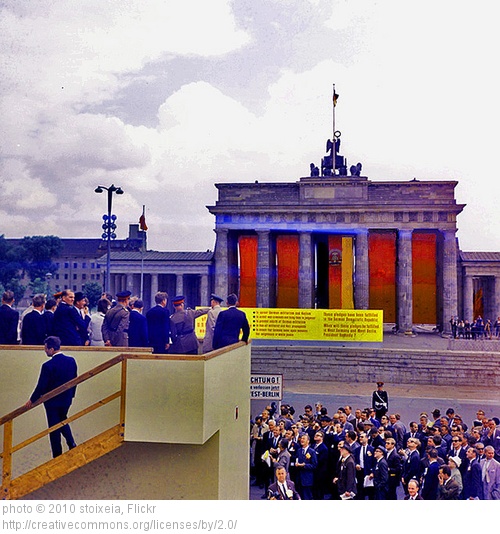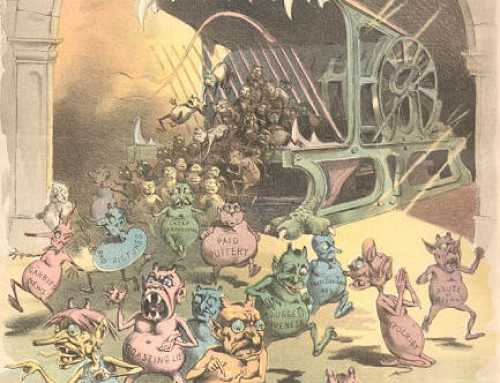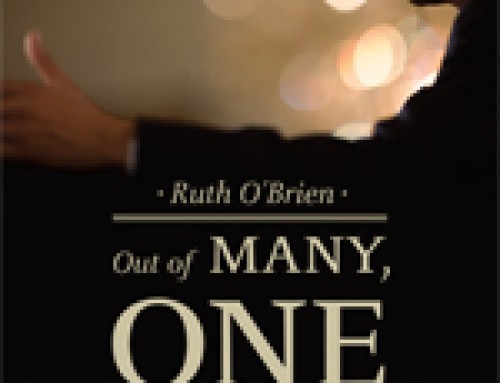 Obama extended his universal anti-universalism abroad yesterday at Brandenburg Gate. This is not exactly an “I’m a Berliner speech,” but rather a “Peace with Justice” speech that is arguably more controversial than JFK’s few words could be, given Obama’s being a “first” just like Angela Merkel (first woman and first leader from the former East Germany). Funny thing is no one is listening, at least in the United States.
Obama extended his universal anti-universalism abroad yesterday at Brandenburg Gate. This is not exactly an “I’m a Berliner speech,” but rather a “Peace with Justice” speech that is arguably more controversial than JFK’s few words could be, given Obama’s being a “first” just like Angela Merkel (first woman and first leader from the former East Germany). Funny thing is no one is listening, at least in the United States.
Peace with Justice not only reflected Obama’s universal anti-universalism, and his preference for religious tolerance and pantheism, but showcased his shared-burden doctrine of American foreign policy and invoked the United States’ need for humility in history by showing solidarity with Germany about the complexity of history.
But most significantly, the Peace with Justice speech advanced Obama’s penchant for Euclidian logic. Starting as a senator, Obama has consistently practiced the Euclidian logic of “necessary and sufficient” found in the pantheism of Baruch Spinoza. This means that Obama practices tolerance in his acceptance of all gods that literary and social theory as well as social philosophy have made accessible by adopting the term “cosmopolitan.”
Relying on a cosmopolitan notion of civic religion — to frame his Cairo speech combating Orientalism or the idea of Western superiority — Obama notes that Islam has always been a part of the American narrative. Now, in Peace with Justice, Obama no longer focuses on the City on a Hill, John Winthrop’s notion that has inflamed the American right wing as well as the Jewish lobby in the United States and Israel, but compares his political thought to that of James Madison, a measured political thinker if there ever was one, though misunderstood for what that middle was.
“No nation could preserve its freedom,” Obama quotes Madison as saying, “in the midst of continual warfare.” Clearly Obama does not want to be wandering in the hills above the Potomac, as Madison did (with his own portrait, as legend goes). “Madison,” Obama argues, “is right — which is why, even as we remain vigilant about the threat of terrorism, we must move beyond a mindset of perpetual war.”
Obama now anchors America’s identity, past and present, in tolerance and religious pluralism. He extends a “peace with justice” theme that is not found in the American Anglo-Saxon Christian lineage, but rather the idea of Hell on Earth. Obama underscores the cultural, linguistic, and geographic diversity of American and German citizens, making his notion of diversity so expansive that civic religion accepts both religion and atheism, as well as emphasizing the need to remember history (hell on earth) with humility.
Obama could make this leap because Merkel’s position as the first “Ossie” chancellor since the Berlin Wall came down created an opening that Obama haters, hopefully, will not use to taint him with fascism.
“ … let’s remember that peace with justice depends on our ability to sustain both the security of our societies and the openness that defines them. Threats to freedom don’t merely come from the outside. They can emerge from within — from our own fears, from the disengagement of our citizens … .”
Chancellor Merkel’s Cold War past made possible this type of nod toward freedom and openness, similar to religious pluralism or tolerance.
Obama uses necessary and sufficient logic to create what I call, in Out of Many, One: Obama and the 3rd American Political Tradition, a jumbling, or “jumping together,” of different and divergent religious traditions around a shared principle of responsibility. In so doing, he unites Germany and the United States in understanding their culpability in history as we all strive toward Peace with Justice.
How big a punch did this speech pack? Little to nothing, or not much in the United States. Only one domestic newspaper covered (or condemned) it this morning – the Washington Times – a paper not known for being partial to Obama’s political thought. It would be more accurate to say it’s a home for Obama haters, though even the Washington Times did not stimulate much hatred less for lack of animus than simply a lack of paying attention to the standing president any more.






